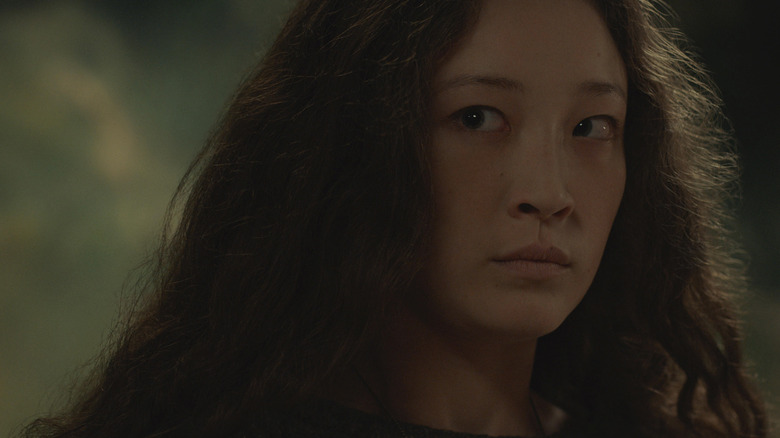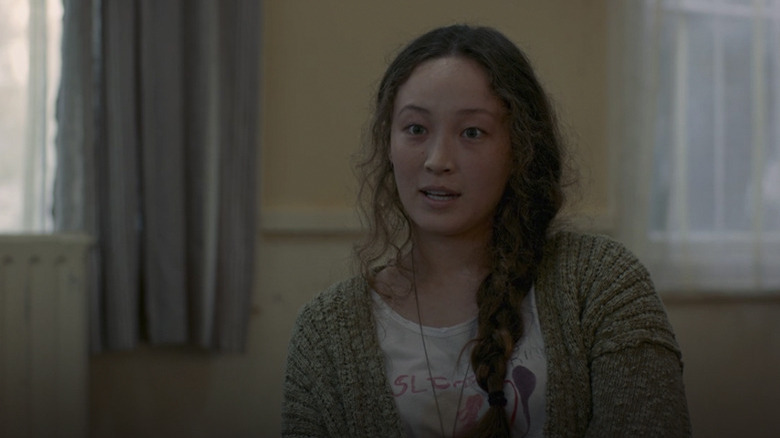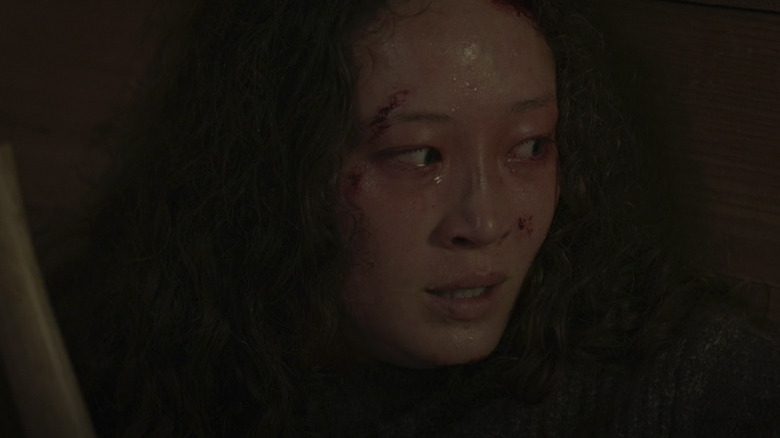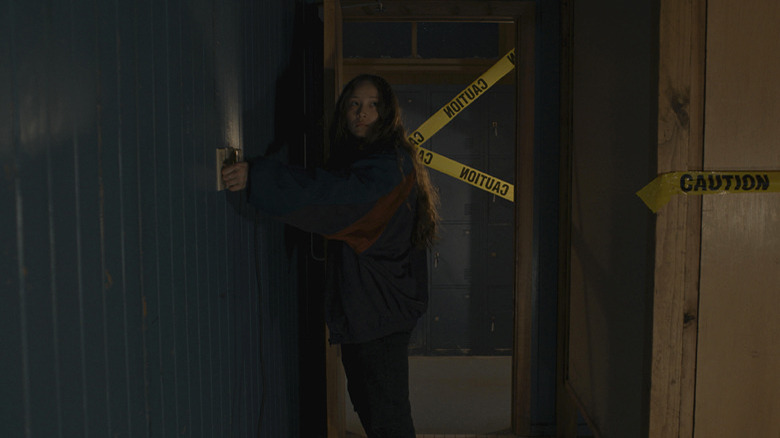No Exit Star Havana Rose Liu On Addiction And The Scene She Dreaded [Interview]
Havana Rose Liu commands the screen as the lead in "No Exit," the new thriller from 20th Century Studios which debuted on Hulu this past Friday. She plays Darby, a young woman desperately trying to get to the hospital in time to see her sick mother, but who is waylaid by a storm. Taking refuge at a visitor center with a handful of other travelers, Darby makes a startling discovery: There's a little girl tied up and trapped in a van in the parking lot. One of her fellow travelers isn't who they seem.
I had a chance to speak with Liu about her playing a character who is dealing with addiction, working in the pandemic era, and more. Be warned, though: I didn't think this conversation would be complete unless we spoke about one of the biggest moments in the movie, so consider this a spoiler warning. If you haven't seen the movie yet, turn back now.
'I also have a Darby dance.'
What kind of preparation did you do when getting ready to play this role?
I don't have any training in the art of acting. For me, my process looks different every time and also is an amalgam of what I do have training in, which is more multimedia arts and dance and even some experimental performance art and a little music. So for me, I had to attack Darby from every angle, and I have a very thick booklet of visual art I've made around this character to understand her internal world, with collages and poetry and things. I also have a Darby dance that allows me to get into it with the playlist I have.
But really, I think the most important aspect of what the preparation offered was to understand the internal world of addiction and really understanding what people who actively experience addiction are going through, and also really where the origin and of that pain and that dependency on the drug comes from. For me, I interviewed a lot of people, friends and family, and also people who were just really generous in sharing their personal experiences and stories with me, that I think colored the internal world of the character and her heart, her decisions, her pain. That was one of the biggest parts of prepping and one of the most challenging, because now I feel very much a sense of frustration at how we talk about it. I think that we talk about it in the wrong way a lot of the time, especially in America. I felt a certain responsibility to try to break open that stereotype on screen as much as possible. So it was very rewarding, too.
Were there any movies that Damien wanted you to watch beforehand to help inform your performance in any way?
I think part of what Damien and I discovered was trying to use humanity as the deepest reference and course of action within this film was important. Because I think it can get caught in replicating different genre pieces or mimicking and then playing off of other turns to other films. That's something very interesting for the filmmaker to do, but I think having that in my psyche while I'm performing the role, we worried it would get in the way of the humanity of it, because that's really what we were trying to portray. So, I think we stayed in people, deeply. We watched interviews together. We passed back and forth documentaries and things like that, which were able to shine a light on different aspects of this character and the different aspects of what she goes through.
'In that moment, she is allowed to express how deeply in pain she is.'
That "nail through the wrist" moment was the point where this movie just gets ratcheted to a whole different level. It was obviously intense for your character, but from a practicality standpoint, what sort of preparation went into that, and what was that like for you?
Yeah, that was one of my favorite scenes, to be honest. I think Darby is, in many ways, an internal character. She has to be, while she's at the visitor center especially, in order to keep up survival. But in that moment, she is allowed to express how deeply in pain she is. She is also allowed to express how honestly in suffering she is, in the moments leading up and the moments after. As an actor, that was so rewarding to be able to finally let that out, versus feeling a keg of intensity inside. It was definitely taxing, and we shot this film mostly in order, so I think I had about three days on the wall. I remember my arm was just like spaghetti afterwards just because of having to hold that position and really thinking about the mechanics so much of how that would function on the surface and what mobility I would have and to play with. It was a test for the imagination and also extremely liberating in a way.
I'm happy to hear that you were really looking forward to that moment because I feel like some people may have dreaded that moment. I was curious when you read the script, before production started, if there was a scene that jumped out at you that you may have been dreading. If so, was the experience of actually filming that better or worse than you imagined?
It's funny. I sort of dreaded the moment where I discovered little Jay in the car. But I actually did dread the scene you spoke about, very much. "Am I going to be able to get there?" That moment requires so much intensity, but that was actually what was so powerful about it. It was probably one of the most rewarding scenes I shot. I remember actually afterwards — New Zealand is like this magical fairyland of incredibleness; I'm shocked it exists. But I remember afterwards, I walked out of the studio, where it's dark and snowy and bloody, out into New Zealand summertime with birds chirping, and there was a double rainbow. And it was the most rewarding moment maybe of my life.
'This is a deeply collaborative sport.'
That's great. So, 80% of your acting credits so far have been released in the pandemic era, which is really weird to think about. How does the experience of filming this movie compare to some of the other work that you've done in the past couple years?
Yeah, you're telling me. It has all been during the pandemic. I literally feel like I'm in a fever dream. It feels very unreal. But I think part of what was so special about shooting "No Exit" was that it occurred in New Zealand, where we were able to have a little bit more freedom than any other Covid set I've been on. I think, with "The Sky is Everywhere" and with "The Chair" and all of those different shoots, you're dealing with people with a ton of masks. You're having to do a lot intuitive communication. What was cool about New Zealand is we still had to be very masked up on set, and we still had to be masked with each other and stay very safe. But in the rest of your life, you were able to roam around and experience things a little bit more freely, yet still very cautiously; we didn't want to stop production. But I think being able to sort of feel like life was still moving allowed a reprieve from the difficulty of the sort of material we were dealing with. So, that did feel different and special.
You had the opportunity to work with a pair of really beloved veteran actors in Dennis Haysbert and Dale Dickey. I'm just curious if you learned anything specific from watching them work.
Oh my gosh. The list is extensive. The amount of professionalism and compassion, more than anything else, that they brought to set, was something a lot of actors could take and learn from. You realize this is a deeply collaborative sport. I felt so held by them. I felt so understood and considered, and I hope that they feel that reciprocity. To me, it changes everything when you have people who are really looking out for one another on a set environment and are able to feed each other. Because in that, you end up building a lot of trust, and especially dealing with difficult material, you end up falling into one another as a source of comfort, as well as being able to play in these more tense dynamics.
"No Exit" is now streaming on Hulu.



